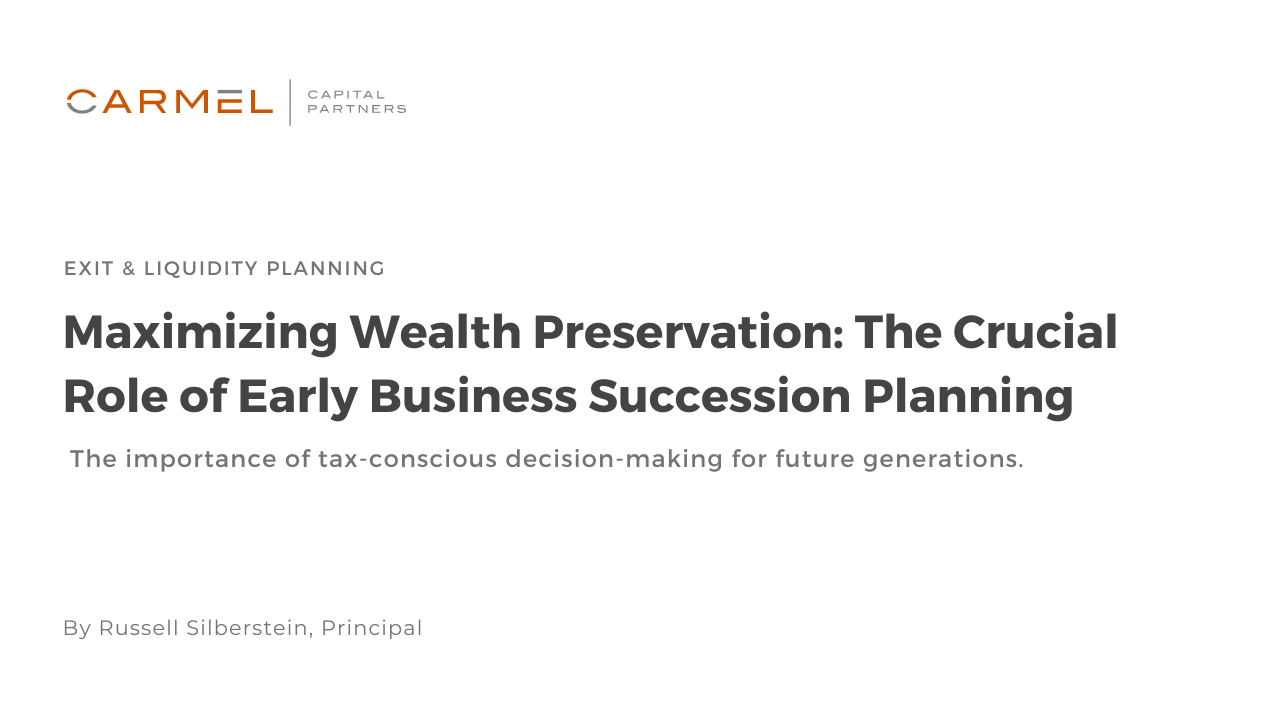Maximizing Wealth Preservation: The Crucial Role of Early Business Succession Planning
For the families we serve, the accumulation of assets and the growth of their businesses are often a result of years of hard work, dedication, and...
2 min read
 Russell Silberstein
:
August 30, 2023 5:00 PM
Russell Silberstein
:
August 30, 2023 5:00 PM
For wealthy families and entrepreneurs, building a successful business is a testament to their vision, hard work, and entrepreneurial acumen. However, as time progresses, it becomes crucial to contemplate the inevitable future and plan for a seamless business transition to the next generation. A well-crafted business succession plan ensures the preservation of the entrepreneur's legacy, maximizes tax efficiency, and minimizes potential disruptions. This article will delve into the importance of creating a tax-conscious business succession plan and explore critical considerations.
A tax-conscious business succession plan is paramount for wealthy entrepreneurs looking to protect their hard-earned wealth. Without a comprehensive plan, business owners risk exposing their assets to significant tax burdens during the transition process. By working closely with experienced tax professionals and financial advisors, entrepreneurs can identify and leverage tax-efficient strategies to minimize potential liabilities.
One of the fundamental principles of effective business succession planning is to start early. Delaying this critical process can lead to rushed decision-making, missed opportunities, and potential complications. By initiating the planning process well in advance, entrepreneurs can carefully consider their goals, evaluate potential successors, and develop a strategy that aligns with their long-term vision.
Selecting the right successor(s) is a pivotal decision in the business succession planning process. Entrepreneurs must assess potential successors' skills, expertise, and values to ensure a smooth transition. This step involves identifying individuals within the organization or the entrepreneur's family who possess the necessary leadership qualities and a deep understanding of the business operations. By providing mentorship, training, and development opportunities, entrepreneurs can groom potential successors to steer the company forward effectively.
An integral aspect of a tax-conscious business succession plan is the implementation of ownership transfer mechanisms that align with the entrepreneur's objectives. Whether gifting shares, selling the business, or establishing a trust, entrepreneurs must carefully evaluate each option's financial implications, tax consequences, and legal intricacies. Seeking guidance from
legal and financial professionals ensures the selection of the most suitable transfer mechanism tailored to the entrepreneur's and the business's unique circumstances.
During the transition process, addressing potential risks that may threaten business continuity is vital. Entrepreneurs should identify key risk factors, such as management gaps, operational disruptions, or family conflicts, and implement strategies to mitigate these risks. This can include comprehensive insurance coverage, contingency plans, and clear communication protocols to ensure a seamless transition for all stakeholders involved.
A tax-conscious business succession plan may involve leveraging tax-advantaged vehicles and structures to optimize wealth preservation. Entrepreneurs can explore options such as family limited partnerships, grantor-retained annuity trusts (GRATs), or charitable remainder trusts (CRTs) to facilitate wealth transfer while minimizing tax exposure. Collaborating with experienced tax advisors can help navigate the complex tax landscape and identify the most advantageous structures for the entrepreneur's specific circumstances.
Crafting a tax-conscious business succession plan is a prudent step for wealthy entrepreneurs aiming to secure their legacy, preserve wealth, and minimize tax implications.
The content is developed from sources believed to be providing accurate information. The information in this material is not intended as tax or legal advice. Please consult legal or tax professionals for specific information regarding your individual situation. The opinions expressed and material provided are for general information and should not be considered a solicitation for the purchase or sale of any security. Investment advisory services are offered through Carmel Capital Partners, an SEC Registered Investment Advisor.

For the families we serve, the accumulation of assets and the growth of their businesses are often a result of years of hard work, dedication, and...

Estate and tax planning are crucial items to complete as part of a family's financial plan. It is a topic that crosses everyone's mind but gets...

After years of hard work building your business, the last thing you want is uncertainty when you step away. Yet, many business owners face this due...